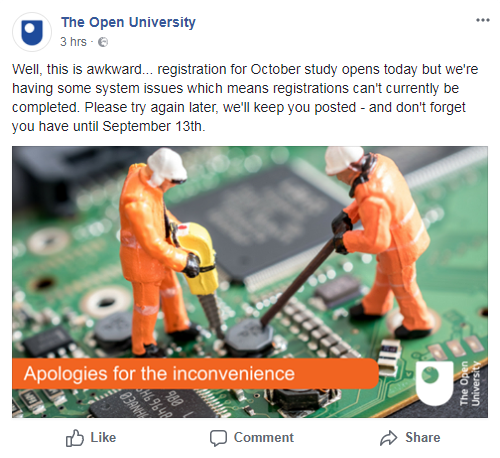This is a record of my journey from start-to-finish in obtaining my BSc (Hons) Computing & IT degree from Open University. I thought it’d be nice to start with how I ended up on this path. Time will tell how far along it I manage to go.
I dropped out of a US high school in the middle of the 11th grade. That’s a year and a half before graduation for those outside the US. (Compulsory education laws can vary state-to-state, and are subject to religious freedoms. Typically, however, it lasts until 16 years of age, even though secondary education lasts to the year students turn 18.) It’s difficult to discuss, but the short version was that I was depressed.
My next educational stop was admittance to the ‘local’ community college. (Again, there’s a cultural divide in describing the US education system to some others. An American community college is a public institution of higher education which mainly grants two-year degrees called associate’s degrees, which are primarily a foundation to a four-year bachelor’s degree at a university. They also tend to offer a limited number of bachelor’s degree programmes like universities, or adult education programmes for obtaining diplomas or continuing/further education.) College was great for me emotionally. However, in addition to being expensive, it was also about forty minutes away by car. When I lost my transport, my commute became two 90 minute bus journeys every day, often for a single 30 minute lecture. It ground me down to the point that I eventually quit that, too, and I entered employment.
My first job was as telephone support for an online service in the days before the World Wide Web. It was a good education in data communications and paid good money, especially for a drop-out.
This led to my next educational stop: distance learning to go back and get my diploma. I was able to do so in short order whilst working, but I despised distance learning at the time. I would buy, collect, or be sent materials, get a sheet of paper telling me what I had to learn, then I showed up for an exam. It was dehumanising, but I was successful.
I thought that was going to be the end of my education. I couldn’t make enough money and have enough time to attend university classes, and I certainly wasn’t going to go back to distance learning.
By 2012 I was married, living in Southern California, and in a great career as a network engineer. I investigated the possibility of distance learning, and found that the Internet had really revolutionised it. It was attractive enough that I thought I’d give it a go again. I researched my options, and found the programme I wanted to follow. It was a few months before I finalised my enrolment. (These British spellings are killing me.)
I had been enrolled for all of about a week when our lives were forced to change. The immigration laws for the UK were being changed rapidly. Soon, it would be a requirement for my wife to be living in the UK and making around £20,000/year for six months before I could move there. If we left immediately, however, we could use our current earnings as an indication of our earning potential in the UK to prove we wouldn’t need to go on benefits, and we could move together without being separated. I had promised my British wife that we would move to the UK before we had children old enough to go to school, so we had no choice but to pack up our lives, withdraw from University, and move to a different continent.
A few years later our son did start school, and I finally had time to enroll at university again. This time I was excited to find Open University. Much more discussion is included in subsequent posts, but the short version is that it’s perfect for my life. My career was already well established over here, even if I was working about 65 hours a week. I was sure I could talk them into giving me a break for study time.
Between the time I contacted Open University and the time they called me back, my company went out of business. And didn’t pay me for my last two months of work, taking £6000 of my money with them. At Christmas.
I found employment again quickly, but my path back to education was blocked again, just as quickly. This time by good news, though; my wife was pregnant with our second son.
He’s still a baby, but we’ve managed to schedule our lives in such a way that I have enough time to finally study a degree at Open University. Time to give it another go.
As I already know what I want to do with my life, I’m going to get a degree in my current field. I’m studying for the BSc (Hons) Computing and IT (Q62) degree from Open University. Another entry probably holds more details on why.
I suppose the one thing still missing from this entry is why it’s important. It’s not. At least not objectively. I have a great job, make good money, have a home in a great location, am blessed with a truly special family I love to bits … Getting a degree isn’t going to make my life any better. It’s just something that’s of great importance to me personally. Part of it is being an example to my children. Part of it is out of respect to my dad. It’s something that’s been left undone, though. Like my diploma, it’s something I need to go back and finish.
